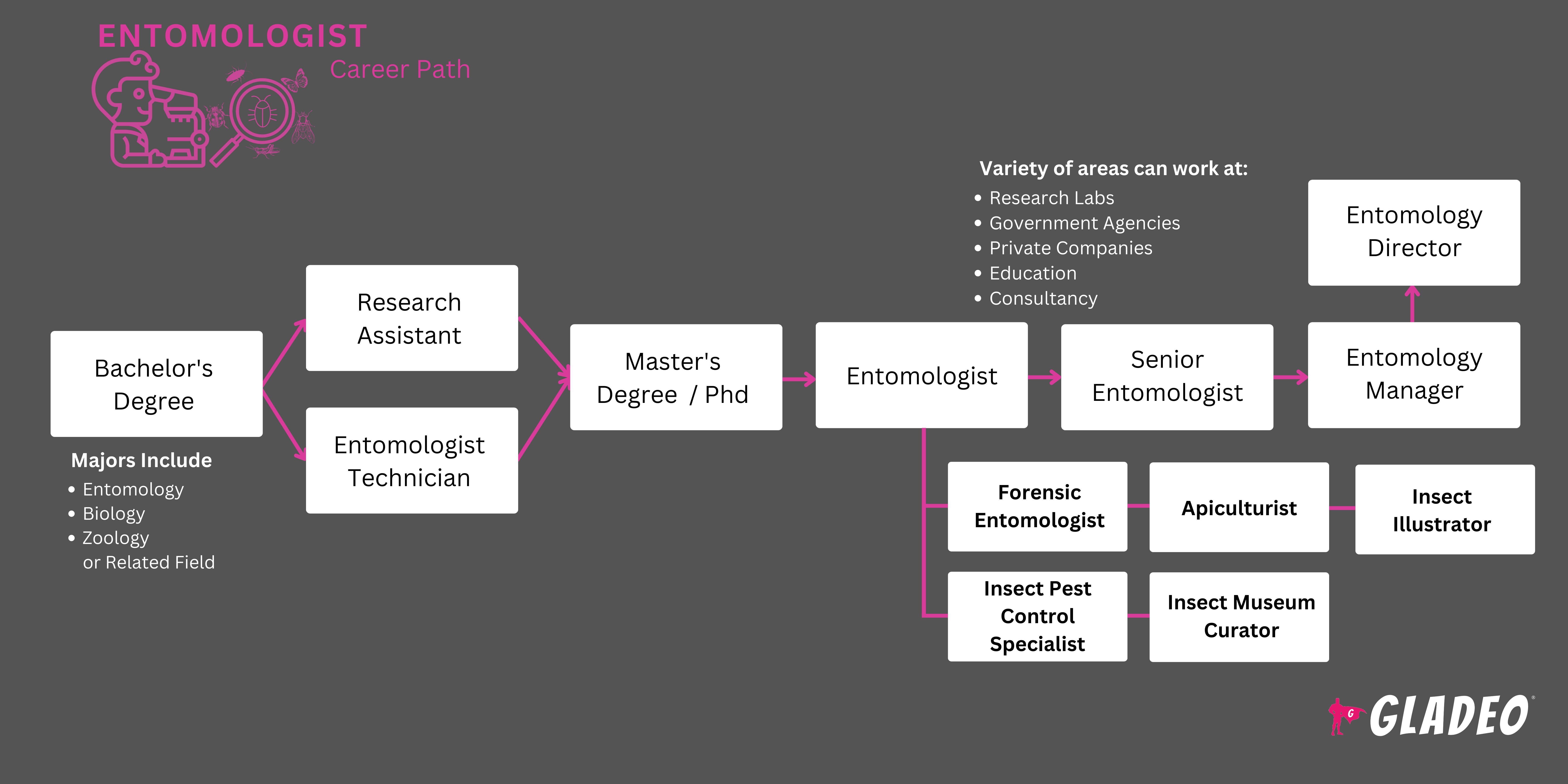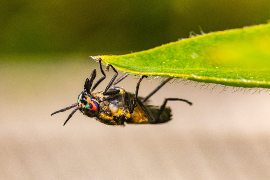Spotlights
Insect Biologist, Insect Scientist, Entomological Researcher, Insect Ecologist, Pest Control Specialist
There are about 10,000,000,000,000,000,000 insects on the planet and almost a million different species of them!
That’s a lot of bugs and it makes them the dominant life form on Earth, according to Cornell University. They’re so adaptable they’re considered “the most evolutionary successful group of terrestrial organisms in the history of life.”
Insects can be extremely helpful to our interconnected web of ecosystems. But they can also cause problems, especially in the agriculture sector. That’s where Entomologists come in to help!
Entomologists are a type of zoologists that specialize in the study of insects and their behavior, biology, ecology, and taxonomy. From gathering samples from the field to running lab tests and studying data, Entomologists seek to understand the impact of insects on the environment, agriculture, and public health. Their work also affects industries like pharmacology, veterinary science, and even crime scene forensics!
- Broadening the scientific understanding of insects and their effects on the world
- Helping develop sustainable pest management solutions
- Contributing to conservation efforts
Working Schedule
- Entomologists work full-time, sometimes in offices or labs, other times outdoors doing fieldwork. Occasional travel is needed, and they may be away from home some nights, weekends, or holidays. During fieldwork, they can be exposed to inclement weather or other environmental conditions.
Typical Duties
- Develop hypotheses and run laboratory tests in controlled surroundings
- Conduct site visits to farms, wildlife areas, or research plots of land
- Observe insects in the wild; take notes on observed behaviors (such as feeding and reproduction) and characteristics; collect samples/specimens for later study
- Write up findings as scholarly articles and submit them to academic journals
- Study current industry discoveries; share findings with peers via published academic papers and conference attendance
- Estimate insect species populations and their effects on local ecosystems, such as plant-insect interactions
- Research how human activities affect insect life; look for ways to mitigate or control pest-related problems in agriculture and other industries (including via insecticide formulations)
- Write reports and conservation plans that feature sustainable practices
- Specialize in species such as ants, beetles, bees, butterflies, crickets, fleas, flies, ladybugs, or mosquitoes
Additional Responsibilities
- Prepare budgets for research work
- Apply for grants, participate in professional organization activities, and contribute to the advancement of the field
- Supervise or mentor assistants and younger researchers
Soft Skills
- Analytical
- Attention to detail
- Communication skills
- Curiosity
- Interpersonal skills
- Investigative
- Objectivity
- Organizational skills
- Patience
- Resourcefulness
- Sound judgment and decision-making
Technical Skills
- Academic/scientific writing
- Biology, chemistry, entomology
- Collection nets (aquatic or pond nets, sweep nets, aerial nets, etc.)
- Data analysis programs such as Genstat
- DNA analysis
- Familiarity with agriscience topics
- Familiarity with lab instruments such as microscopes, dissecting kits, centrifuges, etc.
- Geographic Information Systems like ArcGIS (for mapping insect populations and tracking movements)
- Math and statistics programs such as IBM’s SPSS
- Remote sensing technologies
- Agricultural companies
- College laboratories
- Consulting firms
- Government agencies
- Pharmaceutical industry
- Museums and zoos
- Research facilities
Whether we think about them or not, insects affect us all in countless ways. From our food supplies to our general health, human life is irrevocably linked to the lives and actions of insects. Unfortunately, there aren’t enough active Entomologists to meet the current demand, which places extra responsibilities on those currently working in this vital career field.
Everyone from farms and homeowners to wildlife—and even the environment itself—relies on the diligent efforts of Entomologists to protect food sources, residential and commercial properties, and fragile ecosystems from the harmful effects of pest populations. They must also strike a balance to ensure that helpful insects such as pollinators (honey bees) and pest-eating predators (ladybugs, praying mantises) are protected and used properly.
Think the study of insects doesn’t change much over time? Actually, there are several interesting trends in the field of entomology!
Notably, the increase of technological tools like drones, GIS software, and DNA analysis are boosting efforts to collect data faster and more efficiently. This enables Entomologists to track insect population movements better, which is crucial for identifying areas at risk of infestation. It also helps scientists understand how climate issues affect insect behaviors. This ties into the study of insect ecology (i.e., how insects interact with their environments and how they respond to changes).
Another trend is the ongoing development of more sustainable pest management strategies, such as using pheromones or living biological control agents (without them turning into pests themselves!).
Entomologists most likely enjoyed being outside when they were younger, perhaps gardening or simply observing nature. They are curious-minded but equally analytical persons, who may have liked reading or watching informative videos about science, earth sciences, and wildlife or insects.
- Some entry-level positions may only require a bachelor’s, but most Entomologists have at least a master’s degree in entomology, biology, zoology, environmental science, medical parasitology, or integrated pest management
- Higher-level positions, and college professors, need a PhD
- Common undergraduate courses include:
- Aquatic Habitats
- Biological Control of Insects and Weeds
- Chemistry
- Designer Insects
- Ecology of Pest Management
- Forest Entomology
- Insect Biodiversity and Evolution
- Insect Biology
- Insect Societies
- Insect-transmitted Diseases
- Invertebrate Neurobiology
- Parasites and Pestilence
- Pollinators
- Statistics
- Optional certifications can boost one’s credentials and help them qualify for advancement. Such certs include the Entomological Society of America’s Board Certified Entomologist or Associate Certified Entomologist
- Other organizations also offer certifications, too, such as the Midwest Center of Excellence-Vector Borne Disease’s Public Health Entomology Certificate
- Look for accredited colleges offering majors in entomology, biology, zoology, environmental science, medical parasitology, or integrated pest management
- Consider doing a dual BS/MS degree to save time and money!
- Seek programs with internships or opportunities to get practical experience
- Compare tuition and fees costs, noting in-state vs. out-of-state costs
- Review scholarship and financial aid options
- Check out graduation and job placement statistics for alumni
- In high school, study agriculture-related topics, as well as English, math, earth sciences, chemistry, biology, and botany. Take lab classes and participate in science fairs or research projects
- Participate in nature and agriculture-related clubs and activities like the Supervised Agriculture Experience and Future Farmer of America
- Get outdoors! Try hiking, gardening, or camping to gain exposure to nature. Start a journal or video blog of your insect observations
- Volunteer or get a part-time job at a local nature reserve, zoo, insectarium, botanical garden, or research facility
- Read academic articles and watch documentary videos related to entomology
- Popular YouTube channels with insect videos include:
- BBC Earth
- Free Documentary - Nature
- Insect Stories
- National Geographic
- Nature Bites
- Real Wild
- Science
- Speak with a working Entomologist about how they got started. Check out Ask an Entomologist and other online resources and discussion forums
- Sign up for ad hoc online courses like the ones offered by edX or Udemy, to learn about insects, lab techniques, data analysis, and scientific methodologies
- Keep track of your accomplishments for your resume and/or college applications
- Decide if you want to specialize in a particular species or behavior

- Scan job portals like Indeed.com, Glassdoor, ZipRecruiter, USAJOBS, and other sites
- Having agriculture-related work experience might make you a more competitive applicant. If you want to work directly in an ag-related job before teaching, check out AgriculturalCrossing, EcoFarm (Ecological Farming Association), and Farm and Ranch Jobs
- Consider applying for part-time jobs to get some experience. There are several types of entomology positions, including ones related to:
- Agricultural entomology, biological control, and crop protection
- Forensics
- Forestry
- Industrial and structural entomology
- Medical and taxonomic entomology
- Veterinary entomology
- Ask your network for leads on upcoming job openings. Most jobs are found through connections!
- Ask former professors and supervisors if you can list them as references
- Review sample Entomologist resumes and Entomologist interview questions like “What would you do if you discovered a new species of insect while out in the field?”
- Conduct mock interviews with friends or your school’s career center
- Keep up-to-date on entomology-related technological developments. Demonstrate awareness of trends and terminology during interviews
- Dress appropriately for job interviews
- Knock out extra education and training, such as a higher-level degree or a new certification
- Get specialized in a challenging and/or in-demand area like pest management, medical entomology, or forensic entomology
- Grow your reputation as a subject matter expert. Get published in science journals, write online articles, make educational videos, mentor peers, and participate in professional organization events
- Popular scientific journals include:
- Agricultural and Forest Entomology
- Annual Review of Entomology
- Insect Biochemistry and Molecular Biology
- Insect Molecular Biology
- Journal of Pest Science
- Pesticide Biochemistry and Physiology
- Pest Management Science
- Systematic Entomology
- Strengthen relationships with coworkers, managers, and program administrators
- Take the lead on research projects, consider teaching college classes, or volunteer to serve on committees
- Consider relocating to where there are more (or higher-paying) job opportunities!
Websites
- American Association for the Advancement of Science
- American Society for Horticultural Science
- American Society of Agronomy
- Center for Disease Control
- Crop Science Society of America
- Department of Agriculture
- Entomological Society of America
- Environmental Protection Agency
- Forestry Service
- Midwest Center of Excellence-Vector Borne Disease
- National Alliance of Independent Crop Consultants
- National FFA Alumni Association
- National Institute of Food and Agriculture
- National Institutes of Health
- National Park Service
- Nature Conservancy
- Soil Science Society of America
- The National Academy of Science
- The Wildlife Society
- U.S. Fish and Wildlife Service
- U.S. Food and Drug Administration
- USDA Animal and Plant Health Inspection Service
- Weed Science Society of America
- Zoological Association of America
Book
- Entomology is a Essential Entomology: An Order-by-Order Introduction, by George C. McGavin and Richard Lewington
- Forensic Entomology: The Utility of Arthropods in Legal Investigations, by Jason H. Byrd and Jeffery K. Tomberlin
- Smithsonian Handbook of Interesting Insects, by Gavin Broad, Blanca Huertas, et al.
Entomology is a crucial but relatively small career field. As a result, there may not be an abundance of jobs where you want to live and work. If you’re interested in related occupations, check out the suggestions below!
- Agricultural and Food Scientist
- Agricultural Engineer
- Animal Care and Service Worker
- Biochemist and Biophysicist
- Biologist
- Chemical Technician
- Conservation Scientist and Forester
- Environmental Scientist and Specialist
- Farmer, Rancher, and Agricultural Manager
- Industrial Ecologist
- Microbiologist
- Precision Agriculture Technician
- Veterinarian
- Zoologist and Wildlife Biologist
Newsfeed

Featured Jobs

Online Courses and Tools

Annual Salary Expectations
New workers start around $64K. Median pay is $86K per year. Highly experienced workers can earn around $127K.





